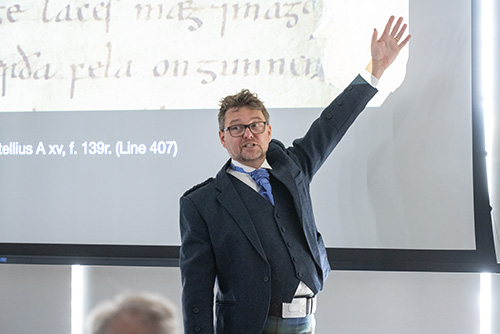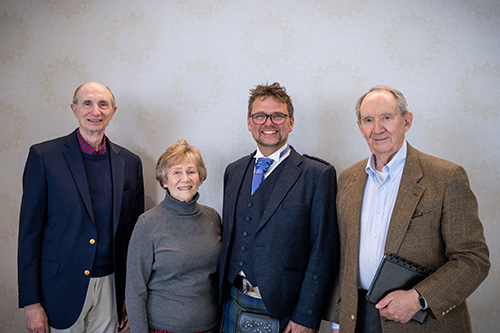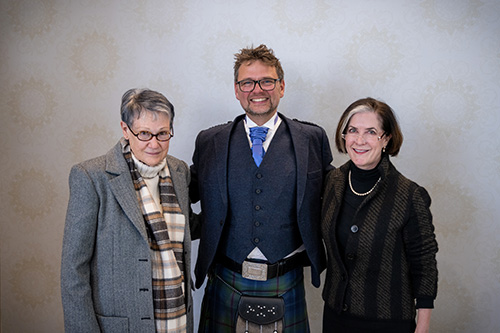Faculty Feature: Medievalism with Chris Jones

Chris Jones giving lecture
Chris Jones, the inaugural ESRR Chair in English at the University of Utah, specializes in medieval literature, especially Old English, and has published widely on the reception of Old English in modern poetry, a subfield of Medieval Studies that his research helped found and shape. His first monograph, “Strange Likeness: the Use of Old English in Twentieth-century Poetry” was runner-up for the European Society for the Study of English best book prize in 2007. He has also co-edited “The Middle Ages in the Modern World: Twenty-first-century Perspectives” for the Proceedings of the British Academy and his second monograph was titled, “Fossil Poetry: Anglo-Saxon and Linguistic Nativism in Nineteenth-century Poetry.” He was previously a professor of English at the University of St Andrews, in Scotland UK, where he taught for more than twenty years, having gained his doctorate there in 2001.
In January 2024, Jones gave the Gordon B. Hinckley Lecture in British Studies, where he discussed the use of motifs from early English literature and history in recent English nationalist discourse, alongside a rise in the online use of neo-Old English phrases by extreme nationalist groups. He argued that these phenomena are not coincidental, but mutually reinforcing, and that ideas of “Anglo-Saxon” ethnic identity are being used to construct false historical justification for extreme nationalist ideologies in England.
Learn more about Jones’ work and discover why he’s a favorite professor among students in the College of Humanities.
Q: What is your research focus?
A: I work on Medieval English Literature (especially Old English poetry, of which Beowulf is the most famous surviving example) and on “medievalism,” or the later reception of the Middle Ages. That can mean anything from poets like Tennyson writing about King Arthur, to William Morris and the medieval-inspired arts and crafts movement, to movies and video games about, or set in, the Middle Ages, to contemporary appropriations of the Middle Ages for political or ideological purposes.
Q: What led you to Medieval English Literature?
A: When I was an undergrad, I just had some niggly feeling that there was something in common between some of the modern poets I was fascinated by (Hopkins, Pound and Auden) and some of the earliest English poems I was learning to translate (“The Wanderer” and “The Seafarer,” which I absolutely adore). That niggly feeling wouldn’t go away, and so several years later I started writing a PhD thesis, trying to prove that an important strain of late nineteenth- and twentieth-century poetry had been influenced by Old English. Back then (the late 90s) no-one believed that Old English had anything to do with English poetry from the time of Chaucer onwards. At conferences people would confidently tell me “but there isn’t any influence from Old English on modern poetry,” or quip “that’s going to be a very short thesis then!” Anyway, I wrote the first book on that subject (“Strange Likeness: the use of Old English in twentieth-century poetry”) and no-one says things like that anymore – hah!
 Q: Tell us more about the focus the Gordon B. Hinckley Lecture in British Studies?
Q: Tell us more about the focus the Gordon B. Hinckley Lecture in British Studies?
A: The lecture was about the investment that strains of twenty-first century English nationalism has in ideas about “the Anglo-Saxons.” That is to say: the inhabitants of medieval England in the period before 1066 and the Battle of Hastings. There’s a recent version of English nationalism, one that got particularly energized in the period leading up to the “Brexit” referendum on leaving the EU, that believes in the idea of an ethnically “pure” Englishness and seeks to find an origin for that idea in the “Anglo-Saxon” period. You see this belief manifesting itself in some of the speeches and newspaper articles written by politicians with an English nationalist and pro-Brexit agenda, but you also find a lot of grassroots nationalists teaching themselves Old English in order to express their beliefs online in neo-Anglo-Saxon slogans.
Q: At the lecture, your students seemed very engaged, and spoke about how much they enjoy your classes. How do you create such an engaged and dynamic student environment?
A: Students here at the U are very engaged, I find. They have a lot of curiosity about things, so it’s not hard to fan the flames of that. And I find being in the classroom fun - sometimes I like to goof around a little - and I think the students can usually see I’m enjoying myself. That can rub off. I really want them to enjoy learning. Because they’re going to be more motivated and keen to go beyond the bare minimum if they are enjoying what they’re doing. Humans are playful, game-playing creatures, and we haven’t left ourselves a lot of spaces where we’re allowed to indulge that in adult life. The classroom can be a space where that’s still allowed. That and just trying to figure out where the students are in their own learning journeys on a particular topic, and pitch to that, rather than trying to teach them what I think is most important from a professional perspective. I might have done something twenty times already, but for them this could be their first encounter with a particular text or an author or an idea, and that’s a really special moment. The freshness of student responses, even if they’re sometimes slightly naïve, helps remind me of what’s amazing about the literature I work on. That’s a real privilege. At the end of last semester, a student said to me “You know, it really matters that you’re so enthusiastic about what you do professor, because frankly a lot of this stuff we have to read is boring!” I’ll take that as a win.
 Q: What do you enjoy about teaching?
Q: What do you enjoy about teaching?
A: The little light-bulb moments that you can actually see on students’ faces when they’re thinking of something in a different way for the first time. Or, when one of them says something I’ve never thought of about a text I’ve read a dozen times. Or, when they hesitantly express something that’s half-forming in their mind as they try to articulate it, and you mirror it back to them in slightly more sophisticated language, and ask, “is that right?” then they glow with pride on hearing their idea repackaged in different words. It’s like some kind of weird alchemy. You go into a room with twenty or thirty people (who don’t know each other well outside of that room at all) and a book that you hope they’ve read, and somehow you spin this web of discussion out of a few prompts. You can’t have a precise idea about how it’s going to go beforehand, and you can’t fully control what happens in the room: the conversation is extemporized collectively out of the contributions everyone makes. It’s so odd. When it goes well, I come out feeling on a kind of high. You can get a real crash later though when all the adrenaline wears off!
Q: How does being named the ESRR Chair in English benefit your work?
A: Honestly, it’s such a privilege and an honor. I feel so proud every time I see those letters next to my name! But in terms of doing my research, it’s tremendously helpful to know that I have that professional security and support behind me. There are funds that enable me to travel to archives I need to work in, or to conferences where I can present my work to peers. And although the donors of the ESRR fund are anonymous, they have communicated to me that they are very pleased with the work I’m doing. That’s enormous. I’m very grateful for the opportunities this Chair offers.
